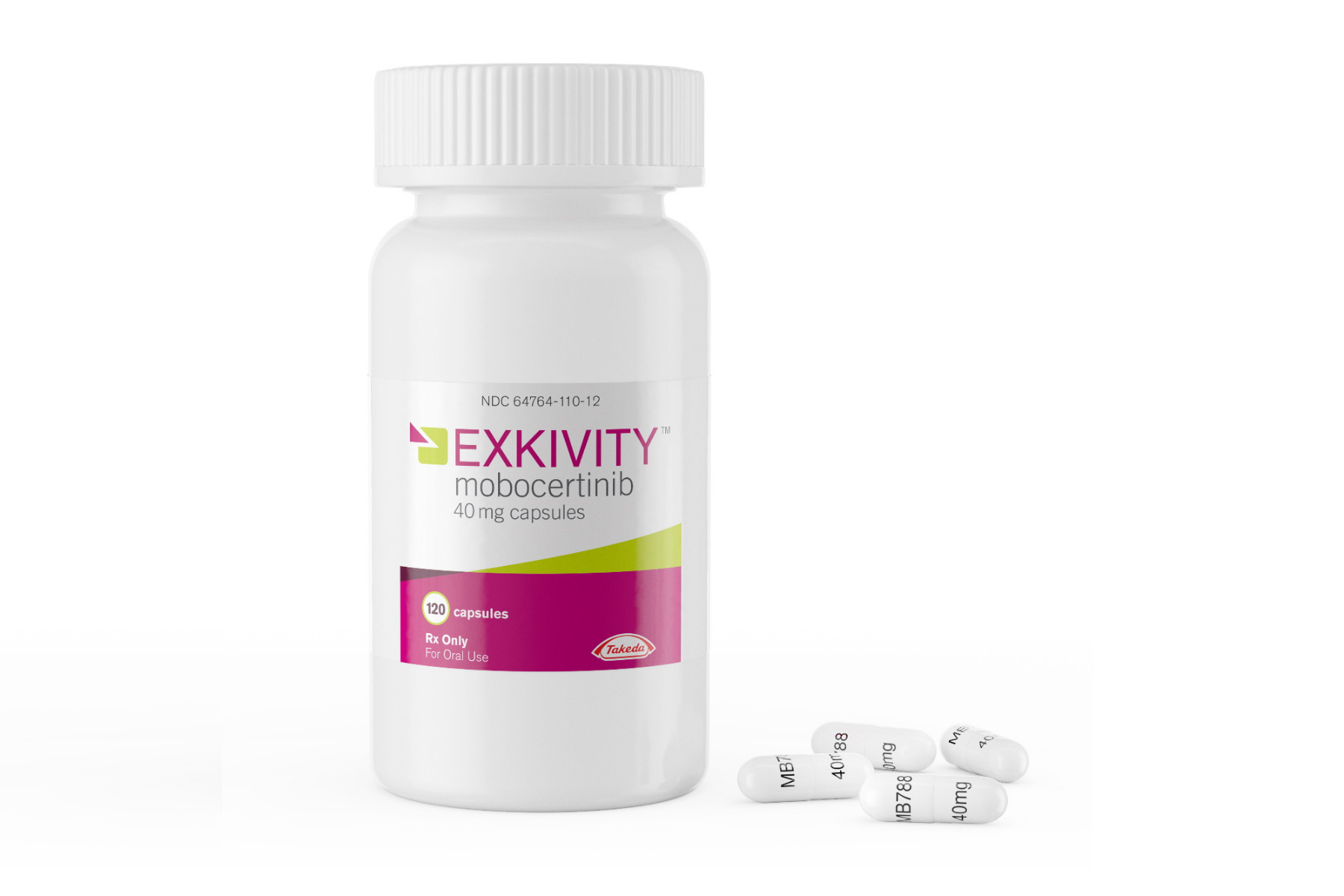Exkivity (mobocertinib) vs Krazati (adagrasib)
Exkivity (mobocertinib) vs Krazati (adagrasib)
Exkivity (mobocertinib) and Krazati (adagrasib) are both targeted therapies designed to treat non-small cell lung cancer (NSCLC) with specific genetic mutations. Exkivity is an oral medication specifically approved for patients with NSCLC characterized by EGFR exon 20 insertion mutations, offering a treatment option for those with this less common mutation. Krazati, on the other hand, targets KRAS G12C-mutated NSCLC, providing an option for patients with this particular mutation, which was previously considered "undruggable." When deciding between the two, it is essential to have your cancer's genetic profile evaluated to determine which mutation is present, as this will directly influence the choice of medication.
Difference between Exkivity and Krazati
| Metric | Exkivity (mobocertinib) | Krazati (adagrasib) |
|---|---|---|
| Generic name | mobocertinib | adagrasib |
| Indications | Non-small cell lung cancer (NSCLC) with EGFR Exon20 insertion mutations | Non-small cell lung cancer (NSCLC) with KRAS G12C mutations |
| Mechanism of action | EGFR inhibitor | KRAS G12C inhibitor |
| Brand names | Exkivity | Krazati |
| Administrative route | Oral | Oral |
| Side effects | Diarrhea, rash, nausea, stomatitis, vomiting, decreased appetite, paronychia, dry skin, decreased weight, and fatigue | Diarrhea, nausea, vomiting, fatigue, hepatotoxicity, and musculoskeletal pain |
| Contraindications | None specifically listed; use with caution in patients with cardiac dysfunction, QT prolongation, or electrolyte abnormalities | None specifically listed; use with caution in patients with a history of QT prolongation or those who are taking medications that can prolong the QT interval |
| Drug class | Tyrosine kinase inhibitor | Small molecule kinase inhibitor |
| Manufacturer | Takeda Oncology | Mirati Therapeutics |
Efficacy
Efficacy of Exkivity (Mobocertinib) in Lung Cancer
Exkivity (mobocertinib) is a medication specifically designed for the treatment of non-small cell lung cancer (NSCLC) with a particular mutation. It targets tumors with epidermal growth factor receptor (EGFR) exon 20 insertion mutations. The efficacy of Exkivity in treating this subset of lung cancer was demonstrated in a multicenter, open-label, single-arm clinical trial. Patients with NSCLC harboring these mutations showed a significant response to treatment with mobocertinib, with a notable percentage achieving partial or complete response to therapy. The duration of response also underscored the potential benefit of this targeted therapy for individuals with limited treatment options.
Understanding the Clinical Trial Results for Exkivity
The clinical trial assessing the efficacy of Exkivity included patients who had previously undergone treatment with platinum-based chemotherapy. The results indicated a promising objective response rate (ORR) and a median duration of response (DoR) that was clinically meaningful. These outcomes suggest that mobocertinib has the potential to be a valuable treatment option for patients with this challenging form of lung cancer. Importantly, the trial's efficacy endpoints were assessed by an independent review committee, adding robustness to the findings.
Efficacy of Krazati (Adagrasib) in Lung Cancer
Similarly, Krazati (adagrasib) is another novel agent targeting KRAS G12C-mutated NSCLC. This mutation has been historically difficult to target with existing therapies. The efficacy of Krazati has been evaluated in a phase 1/2 clinical trial, where it demonstrated significant anti-tumor activity in patients with NSCLC harboring the KRAS G12C mutation. The ORR and DoR in these patients provided evidence that adagrasib could be an effective treatment for this specific lung cancer population, which often has poor prognosis and limited treatment options.
Insights from Krazati Clinical Trials
The clinical trials for Krazati showed that a substantial proportion of patients achieved a partial response, and the median progression-free survival (PFS) indicated a durable response for many patients. These results are particularly encouraging given the refractory nature of KRAS G12C-mutated NSCLC to traditional chemotherapeutic agents. The data from the trials suggest that adagrasib may offer a new hope for patients with this specific genetic alteration, which is present in a significant minority of NSCLC cases.
Regulatory Agency Approvals
Exkivity
-
Food and Drug Administration (FDA), USA

Krazati
-
European Medical Agency (EMA), European Union

-
Food and Drug Administration (FDA), USA

Access Exkivity or Krazati today
If Exkivity or Krazati are not approved or available in your country (e.g. due to supply issues), you can access them via Everyone.org.
How it works

Make an enquiry
Choose the medicine you want to buy, answer a couple of questions, and upload your prescription to speed things up. We’ll get back to you within 24 hours.


Make an enquiry
Choose the medicine you want to buy, answer a couple of questions, and upload your prescription to speed things up. We’ll get back to you within 24 hours.


Breeze through the paperwork
We'll guide you through the required documents for importing unapproved medicine, ensuring you have all the necessary information.


Get a personalized quote
We’ll prepare a quote for you, including medicine costs and any shipping, administrative, or import fees that may apply.


Receive your medicine
Accept the quote and we’ll handle the rest - sourcing and safely delivering your medicine.

Some text on this page has been automatically generated. Speak to your physician before you start a new treatment or medication.
Let's talk
If you have any questions, call us or send us a message through WhatsApp or email:
Contact us




